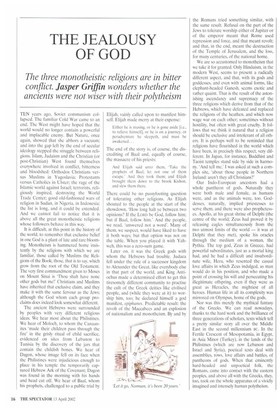THE JEALOUSY OF GOD
The three monotheistic religions are in bitter
conflict. Jasper Griffin wonders whether the
ancients were not wiser with their polytheism
TEN years ago, Soviet communism collapsed. The familiar Cold War came to an end. The West might have hoped that the world would no longer contain a powerful and implacable enemy. But Nature, once again, showed that she abhors a vacuum; and into the gap left by the end of secular ideology stepped the struggle between religions. Islam, Judaism and the Christian (or post-Christian) West found themselves everywhere involved in conflict, bitterness and bloodshed: Orthodox Christians versus Muslims in Yugoslavia; Protestants versus Catholics in Ulster; the rage of the Islamic world against Israel; terrorists, religiously inspired, destroying the World Trade Center; good old-fashioned wars of religion in Sudan, in Nigeria, in Indonesia; the list is long, and it could be extended. And we cannot fail to notice that it is above all the great monotheistic religions whose followers behave in this way.
It is difficult, at this point in the history of the world, to remember that exclusive belief in one God is a plant of late and rare blooming. Monotheism is hammered home insistently by the religions with which we are familiar, those called by Muslims the Religions of the Book; those, that is to say. which grow from the root of the Old Testament. The very first commandment given to Moses on Mount Sinai is 'Thou shalt have none other gods but met' Christians and Muslims have inherited that exclusive claim, and they make it with the same fervour as the Jews; although the God whom each group proclaims does indeed look somewhat different.
The ancient Hebrews were surrounded by peoples with very different religious ideas. We hear most about the Philistines. We hear of Moloch, to whom the Canaanites 'made their children pass through the fire' in the grisly ritual of child sacrifice, evidenced on sites from Lebanon to Tunisia by the discovery of the jars that contain the childish bones. We hear of Dagen, whose image fell on its face when the Philistines were injudicious enough to place in his temple the temporarily captured Hebrew Ark of the Covenant; Dagon was found in the morning with his hands and head cut off. We hear of Baal, whom his prophets, challenged to a public trial by Elijah, vainly called upon to manifest himself. Elijah made merry at their expense:
Either he is musing, or he is gone aside [i.e., to relieve himself], or he is on a journey, or peradventure he sleepeth, and must be awakened...
The end of the story is, of course, the discrediting of Baal and, equally of course, the massacre of his priests:
And Elijah said unto them, 'Take the prophets of Baal; let not one of them escape.' And they took them; and Elijah brought them down to the brook Kishon, and slew them there.
There could be no pussyfooting question of tolerating other religions. As Elijah shouted to the people at the start of the showdown, 'How long halt ye between two opinions? If the LORD be God, follow him; but if Baal, follow him.' And the people, we read, 'answered not a word'. Many of them, we suspect, would have liked to have it both ways; but that option was not on the table. When you played it with Yahweh, this was a zero-sum game.
Later on, it was the Greek gods with whom the Hebrews had trouble. Judaea fell under the rule of a successor kingdom to Alexander the Great, like everybody else in that part of the world, and King Antiochus made a determined effort to get this tiresomely different community to practise the cult of the Greek deities like civilised people, and (while they were at it) to worship him, too; he declared himself a god manifest, epiphanes. Predictable result: the revolt of the Maccabees and an explosion of nationalism and monotheism. By and by the Romans tried something similar, with the same result. Refusal on the part of the Jews to tolerate worship either of Jupiter or of the emperor meant that Rome used repression and force, and that meant revolt; and that, in the end, meant the destruction of the Temple of Jerusalem, and the loss, for many centuries, of the national home.
We are so accustomed to monotheism that we take it for granted. Only Hinduism, in the modern West, seems to present a radically different aspect, and that, with its gods and goddesses, and even with animal forms, like elephant-headed Ganesh, seems exotic and rather quaint. That is the result of the astonishing ascendancy and supremacy of the three religions which derive from that of the Hebrews, which have defeated and replaced the religions of the heathen, and which now wage war on each other; sometimes without hostility, but often with great cruelty. It follows that we think it natural that a religion should be exclusive and intolerant of all others. It is perhaps well to be reminded that religions have flourished in the world which have been, in precisely this respect, very different. In Japan, for instance, Buddhist and Taoist temples stand side by side in harmony. `And tell me,' I was asked at such a complex site, 'about those people in Northern Ireland: aren't they all Christians?'
Our Indo-European ancestors had a whole pantheon of gods. Naturally they were both male and female, as humans were, and as the animals were, too. Goddesses, naturally, implied priestesses to serve them, and there were also prophetesses. Apollo, at his great shrine of Delphi (the centre of the world; Zeus had proved it by releasing eagles simultaneously from the two utmost limits of the world — it was at Delphi that they met), spoke his oracles through the medium of a woman, the Pythia. The top god, Zeus in Greece, had powerful subordinates, just as a mortal king had, and he had a difficult and insubordinate wife, Hera, who resented the casual love affairs in which Zeus indulged, as man would do in his position, and who made a point of crossing his will and persecuting his illegitimate offspring, even if they were as great as Heracles, the mightiest of all heroes. Human life in all its complexity was mirrored on Olympus, home of the gods.
Nor was this merely the mythical fantasy of the Greeks. We can read nowadays, thanks to the hard work and the brilliance of three generations of scholars, texts which tell a pretty similar story all over the Middle East in the second millennium BC. In the Fertile Crescent of Mesopotamia, in Egypt. in Asia Minor (Turkey), in the lands of the Philistines (which are now Lebanon and Israel and Syria), poetical texts deal with assemblies, rows, love affairs and battles, of pantheons of gods. When that eminently hard-headed and unpoetical folk, the Romans, came into contact with the eastern peoples, and above all with the Greeks, they, too, took on the whole apparatus of a vividly imagined and intensely human polytheism.
It had the disadvantage that not all the actions and emotions of its deities were admirable. Adultery and sexual misconduct loomed large, as did violence and jealousy and favouritism. That weak point was mercilessly exploited by the Christians: 'Just look what wretches your gods are, on your own showing!' It also had great advantages. It could explain why things did not always go well and why prayers were not always answered; some other divinity perhaps cut in and countermanded them. Or they were caught up in a fundamental clash between aspects of existence which were irreconcilable, and which all had their divine patrons: chastity versus sexuality; puritanism versus exuberance; the destiny of Rome (supported by Venus) versus that of her enemy Carthage (supported by Juno).
What was more, it meant that heaven reflected more of human life than our modern monotheisms can do. The female side of sexuality and reproduction was the province of formidable goddesses; there was a great god — the Greeks called him Dionysus — whose scope included intoxication and drunkenness; Zeus himself had overthrown his own father to attain the kingship, and the memory was always present, and sometimes invoked, to justify rebellion and unfilial activities. We remember Kipling's Indian woman:
To mine own gods I go; It may be they will give me greater ease Than your cold Christ and tangled Trinities.
Two attempts that we know of were made to escape from the splendours and miseries of polytheism. In the middle of the second millennium BC, the pharaoh Akhenaton declared the supremacy of a single god, Atun, the Sun; he alone was divine. After his death the priests of normal Egyptian religion succeeded in suppressing his heretical innovation. Egyptian religion was not only (as was usual) polytheistic, but also, to the embarrassment or derision of Egypt's neighbours, gave a central position to gods in the form of animals: cats and crocodiles and hippopotami. Greeks could never take that seriously.
In its homeland, Akhenaton's subversive monotheism was dead. It lived on, however, in the minds of the Hebrews, a people whom tradition declared to have been enslaved in Egypt and brought out by Moses, a deliverer and religious reformer, who looks very like an Egyptian, and whom Sigmund Freud declared to have been one. The Hebrews, then, outraged the moral and religious sense of all their neighbours by proclaiming the existence of only one god: their God.
It seems clear from the extant texts that at first they limited themselves to the claim, more modest but still challenging, that their God was greater than those of other, competing tribes. Thus they proclaim that 'the Los]) is a great God, and a great King above all gods' — language which clearly assumes that other gods, albeit inferior, do exist. But at least one passage has survived the stringent censorship which was applied to the old texts after the return from the Babylonian captivity in the 5th century sc. At one moment in the Pentateuch we find the Hebrews saying to the people of Ammon:
Wilt thou not possess that which Chemosh thy god giveth thee to possess? So whomsoever the LORD our God hath dispossessed from before us, them will we possess. (Judges xi 24)
That is to say, your tribal god has given you a certain territory; in the same way, our God has permitted us to oust certain peoples from their territory and has given it to us — we have as good a right to our conquests as you have to the lands that you possess. That claim still haunts the Middle East, though nowadays politicians couch it in rather different language.
The assumption that different peoples have different chief gods, each of whom doubtless does the best he can for his people, is a natural one, but later monotheism airbrushed out such passages. The God of the Hebrews was not just better than other gods, he was actually the only god — the others were not gods at all:
Eyes have they and see not; ears have they and hear not; neither speak they through their throat.
It is not surprising that other peoples found this new claim enraging and difficult to accept.
When a man from one ancient society found himself dealing with another, in trading or travelling or war, he felt curiosity about the local arrangements in the matter of religion. Interesting shrines and statues met his eye; unfamiliar names and stories met his ear. Naturally he asked for explanations: 'Who is that?'; 'Why do you do this?'; 'Why is today a festival?' The natives would explain, and the inquirer normally thought along such lines as these: 'Oh yes, that is the goddess whom we know and call So-and-so.'
The great historian Herodotus explains Egyptian deities to his Greek readers in this way: Osiris 'is' Dionysus, and so on. Stories which were too bizarre to be readily fitted in could be brushed under the carpet with the explanation that they were 'mysteries', tales with a hidden meaning, revealed only to adepts. Herodotus is impressed by Egyptian culture, and his attitude to the religion is respectful. The Persian king Cambyses, having conquered Egypt, made a point of insulting the local cults; for Herodotus that is evidence that he was mad, 'for all men have their own ideas about the divine, and they all think theirs are the best; so only a madman insults other people's beliefs and practices'.
It was also possible to find that a foreign god filled a gap in one's own religious arrangements. The Egyptian mother goddess Isis soon began to be worshipped both in Greece and in Rome; no goddess of theirs was motherly in quite that comforting sense. The Romans, supreme conquerors and looters — or perhaps 'collectors' would be a more diplomatic word — picked up foreign gods as they picked up foreign works of art. A plague led them to import from Greece the medical god Asclepius; when things were going badly in the wars with Carthage, and public morale was shaky, the exotic and spectacular cult of the Mother of the Gods was imported, with great pomp and hoop-la, from Asia Minor. Both deities continued to be worshipped at Rome. There was even a regular ritual — we have the words — to be used when one was on the point of storming an enemy city. It was the proper thing to invite the gods of the city to come over to your side, offering them the prospect of continuing honours.
The exclusive claims and demands of the Jewish God, and then of the God of the Christians, stand out in this setting as radically alien. The Athenians to whom St Paul preached assumed that he was introducing a new goddess named Resurrection, who sounded interesting, and who could presumably be fitted into the pantheon with all the others. We hear of highranking Romans including Christ in their personal chapels along with other deities, as just one more, of essentially the same kind as the rest. On the other hand, it was the exclusiveness of the Christians — who denounced the public cults, refused to conform and would not offer sacrifices for the health of the emperor — which brought down on them the persecutions, themselves so alien to classical thought and practice, which were to prove the strength of the new religion.
The last stand of Roman paganism was made in the Senate, where the emperors, now Christian, demanded the removal of the altar of Victory, conceived as a goddess. It was the turn of the pagans to urge the merits of toleration. 'It is not granted to us,' pleaded an eloquent pagan grandee, 'to approach so great a mystery by one single path.' The plea for tolerance — a tolerance, of course, which Rome had denied to Christianity — was in vain. The pagan religion was made illegal; its deities were redefined as demons; its shrines were demolished.
And so the course was set. Great as the triumphs are of the Religions of the Book, marvellous as we find their literatures, their architecture and their philosophy, they have all retained, more or less, that exclusive and fiery intolerance, born in the harsh setting of the Near Eastern deserts, and living on, to our fearful cost, in Palestine and Kosovo, Afghanistan and Nanterre, Belfast and the World Trade Center. There was, after all, something to be said for the pagan days, when a new god could be signed up and expected to fit in with all the rest, in a spirit rather like that in which a soccer club transfers a star player from another team.




















































































 Previous page
Previous page